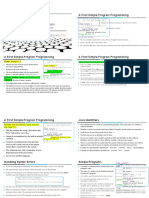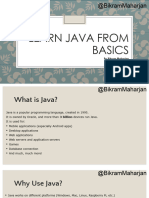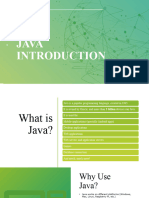0 ratings0% found this document useful (0 votes)
4 viewsJava Syntax and Variables
The document provides an overview of Java syntax and variables, emphasizing that every Java application must have a class and a main method. It explains the use of comments, the types of variables, and how to declare and initialize them. An example code snippet demonstrates variable usage and encourages the reader to modify it for personal details.
Uploaded by
dolatkumar913Copyright
© © All Rights Reserved
We take content rights seriously. If you suspect this is your content, claim it here.
Available Formats
Download as PDF, TXT or read online on Scribd
0 ratings0% found this document useful (0 votes)
4 viewsJava Syntax and Variables
The document provides an overview of Java syntax and variables, emphasizing that every Java application must have a class and a main method. It explains the use of comments, the types of variables, and how to declare and initialize them. An example code snippet demonstrates variable usage and encourages the reader to modify it for personal details.
Uploaded by
dolatkumar913Copyright
© © All Rights Reserved
We take content rights seriously. If you suspect this is your content, claim it here.
Available Formats
Download as PDF, TXT or read online on Scribd
You are on page 1/ 3
Java Syntax and Variables
# 1. Java Syntax Basics
Java programs are made up of statements, which are executed in order. Let's break down the
syntax:
public class Example {
public static void main(String[] args) {
System.out.println("Java Syntax!");
}
}
- Every Java application must have a class.
- The main method (main()) is where the program starts.
- Statements end with a semicolon (;).
- Curly braces {} define blocks of code.
# 2. Comments in Java
Comments help explain code but are ignored by Java when running the program.
// This is a single-line comment
/*
This is a multi-line comment.
It spans multiple lines.
*/
# Variables in Java
Variables store data in memory. Java is statically typed, meaning we must declare variable types.
# 3. Types of Variables
| Type | Example | Description |
|-----------|----------------|-------------------------------|
| int | int age = 16; | Stores whole numbers |
| double | double pi = 3.14; | Stores decimal numbers |
| char | char letter = 'A'; | Stores a single character |
| boolean | boolean isJavaFun = true; | Stores true/false |
| String | String name = "Dolat"; | Stores text |
# 4. Variable Declaration & Initialization
- Declaration: int number;
- Initialization: number = 10;
- Combined: int number = 10;
Example:
public class Variables {
public static void main(String[] args) {
int age = 16;
double height = 5.9;
char grade = 'A';
boolean isJavaFun = true;
String name = "Dolat";
System.out.println("Name: " + name);
System.out.println("Age: " + age);
System.out.println("Height: " + height);
System.out.println("Grade: " + grade);
System.out.println("Java is fun: " + isJavaFun);
}
}
# Task for You:
1. Run the above code and understand the output.
2. Modify it to store and print your own details.
You might also like
- Java Programming Fundamentals: By: Jayfee D. RamosNo ratings yetJava Programming Fundamentals: By: Jayfee D. Ramos52 pages
- Java Programming Language: Introduction ToNo ratings yetJava Programming Language: Introduction To113 pages
- Introduction To Java (Prequel For Android)No ratings yetIntroduction To Java (Prequel For Android)155 pages
- Java - : Google's Android Os Media Players Antivirus Web App Desktop App EtcNo ratings yetJava - : Google's Android Os Media Players Antivirus Web App Desktop App Etc4 pages
- Hour 5. Storing and Changing Information in A ProgramNo ratings yetHour 5. Storing and Changing Information in A Program14 pages
- DCIT 22 Computer Programming 1 Lecture 4No ratings yetDCIT 22 Computer Programming 1 Lecture 440 pages
- Module in Cc103 Intermediate Programming JavaNo ratings yetModule in Cc103 Intermediate Programming Java107 pages
- Java Programming Tutorial: Introduction To Java Programming (For Novices & First-Time Programmers)No ratings yetJava Programming Tutorial: Introduction To Java Programming (For Novices & First-Time Programmers)20 pages
- CPE402 Chapter3 Programming Language Fundamentals - FinalNo ratings yetCPE402 Chapter3 Programming Language Fundamentals - Final139 pages
- BE EXPERT IN JAVA Part- 2: Learn Java programming and become expertFrom EverandBE EXPERT IN JAVA Part- 2: Learn Java programming and become expertNo ratings yet
- Important_Questions_BISP_Mirpurkhas_10th_Class_Exams_2024_2025No ratings yetImportant_Questions_BISP_Mirpurkhas_10th_Class_Exams_2024_20253 pages
- 3. B.Ed (1.5 Years, 2.5 Years, 4 Years)No ratings yet3. B.Ed (1.5 Years, 2.5 Years, 4 Years)70 pages







































































